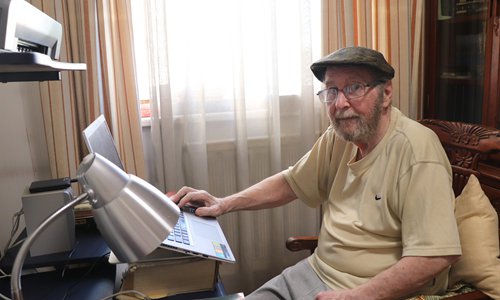HOME >> ARTS
Foreign translator and editor Paul White reflects on China’s 40-year evolution
By Liu Zhongyin Source:Global Times Published: 2019/8/19 17:45:31

Paul White Photo: Liu Zhongyin/GT
Paul White came to work in the Chinese mainland in 1984 after working in the media industry in Hong Kong for five years. According to him, he initially planned to stay in the Chinese mainland for just a year.
"What kept me here basically are changes. Every year sees more changes, more prosperity, compared to what China used to be," he told the Global Times on Friday.
White is a renowned foreign expert specializing in editing and translation. Now in his 70s, he retired in 2017 from China International Publishing Group's Foreign Languages Press, where he edited a tremendous number of English publications.
White was awarded the Certificate of Friendship by the State Administration of Foreign Experts Affairs of the People's Republic of China in 2007 and received the Special Book Award of China in 2017, two highly recognized awards.
Although retired, the British national still spends a lot of time working, doing translations and writing a monthly column about China for the Morning Star, a British daily newspaper. He called himself a workaholic and said he works from his flat located in a serene household community in downtown Beijing.
Pursuing a career
Although he had studied Chinese at the University of London before heading to Hong Kong in 1979, a time when the city was still under British rule, White noted that he only spoke a little Chinese.
White spent years familiarizing himself with the cultural context of idioms, something that is difficult to master only relying on books. As his language skills improved, he began getting involved in translation.
The works he took part in translating or editing covered a wide range of genres and topics. Some were books about Chinese policies and ideologies, like the Chinese Dream and the One Country, Two Systems, while others were ancient classics such as The Commentary of Zuo and The Analects of Confucius. There were also some practical works covering the latest social topics such as China's high-speed railway.
White said he still feels excited about the editing he did on the translation of the six-volume Compendium of Materia Medica, an encyclopedia of herbal medicine complied during the Ming Dynasty (1368-1644).
"It's fascinating because the author traveled his whole life, traveled all over China, collecting herbs and testing them. It's a worldwide classic. It's fascinating to find out what people took as medicines in those days," he said.
Apart from translation or editing work, White has extensive experience in the media. He worked as an editor for the Xinhua News Agency for 12 years in the Chinese mainland before joining the Foreign Languages Press.
As someone who still writes for a newspaper, White has paid a lot of attention to the protests in Hong Kong. He has pointed out that the problems of unemployment, low wages and high living expenses some protestors have complained about also existed back when Hong Kong was under British rule. He noted that Hongkongers should realize that the prosperity the central government hopes for will be deteriorated by these damaging protests.
Overwhelming changes
White says he remembers very clearly what Beijing was like in the 1980s. Back then, and even through the 1990s, it was very difficult to get a taxi, as they had to be booked in advance at a hotel.
However, over the following decade and a half, taxis multiplied and could be found everywhere. White notes that he finds it amusing that in today's age of smart phones, the situation has returned to the 1980s in a way, since taxis can no longer be hailed freely on the streets and instead must be booked through one's smart phone.
"Now you see empty taxis, but they're already going somewhere," White pointed out.
He visits Britain about once a year. He noted that except for ever rising prices, everything in his hometown has remained the same. As to why he hasn't gone back for his retirement, White said that he wants to continue to observe the changes that are taking place in the Chinese mainland.
In his opinions, China is interacting with the rest of the world more than ever.
Back in the 1980s, Chinese people seldom had the opportunity to travel abroad, while nowadays Chinese tourists are everywhere throughout Asia, Europe, the Americas and Australia. Back when he first came to the capital, his first impression was that Beijing was nothing more than a large rural "village," but over the years it has become an extraordinary cosmopolitan city that attracts foreigners from all over the world.
The advances in technology have also grabbed White's attention. While he still prefers using cash, everywhere he goes he sees people today using phones to make mobile payments.
White said that he can tell that the people he sees using these new payment methods are just ordinary people, not members of some rich family, yet he feels these people are far more relaxed when it comes to money. In his eyes, this is one of the most noticeable changes among today's Chinese and it shows that they are far better-off materially speaking.
Among the piles of translated publications on the table in his living room, White showed off the newly printed version of The Analects of Confucius that he had worked on and pointed to a QR code in the book, noting in a rather excited voice that readers can now listen to an audio version of the book by scanning the code.
Newspaper headline: Changing times
Posted in: BOOKS,ARTS FOCUS